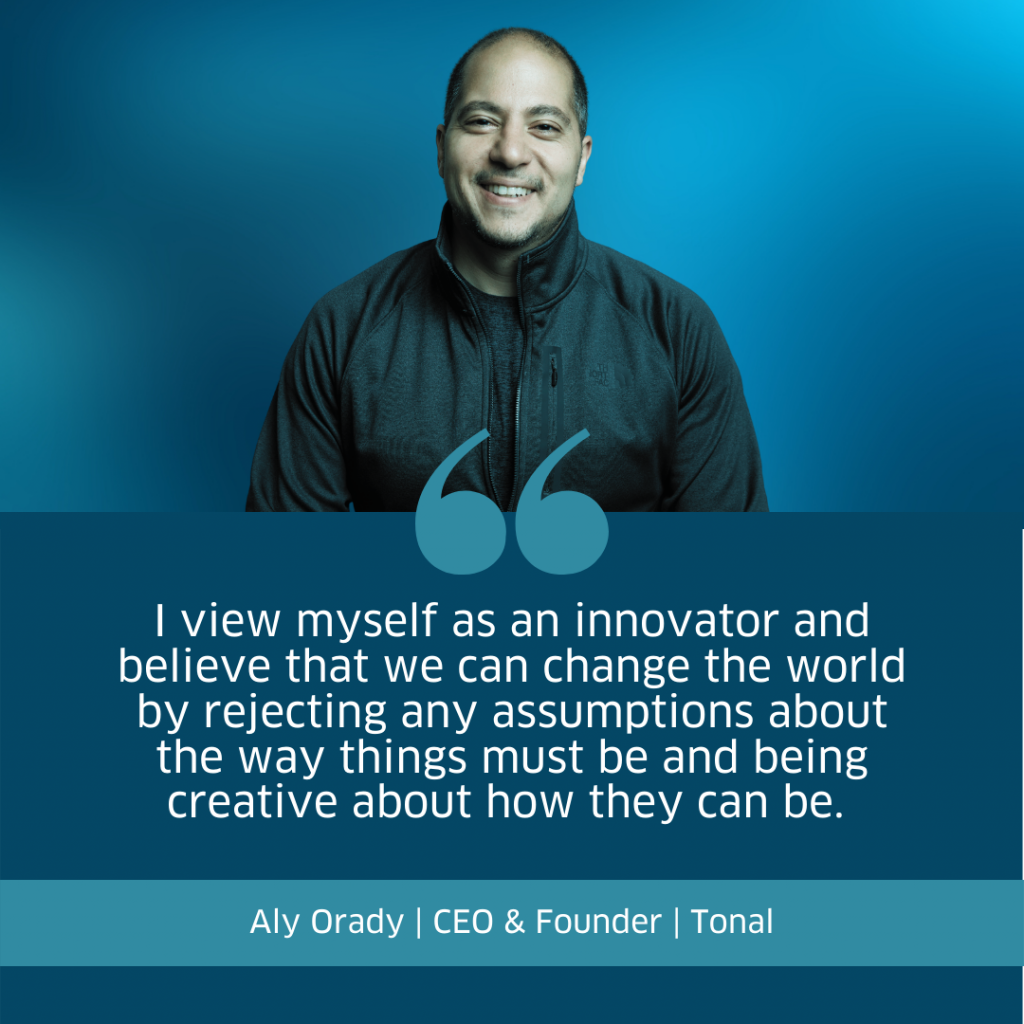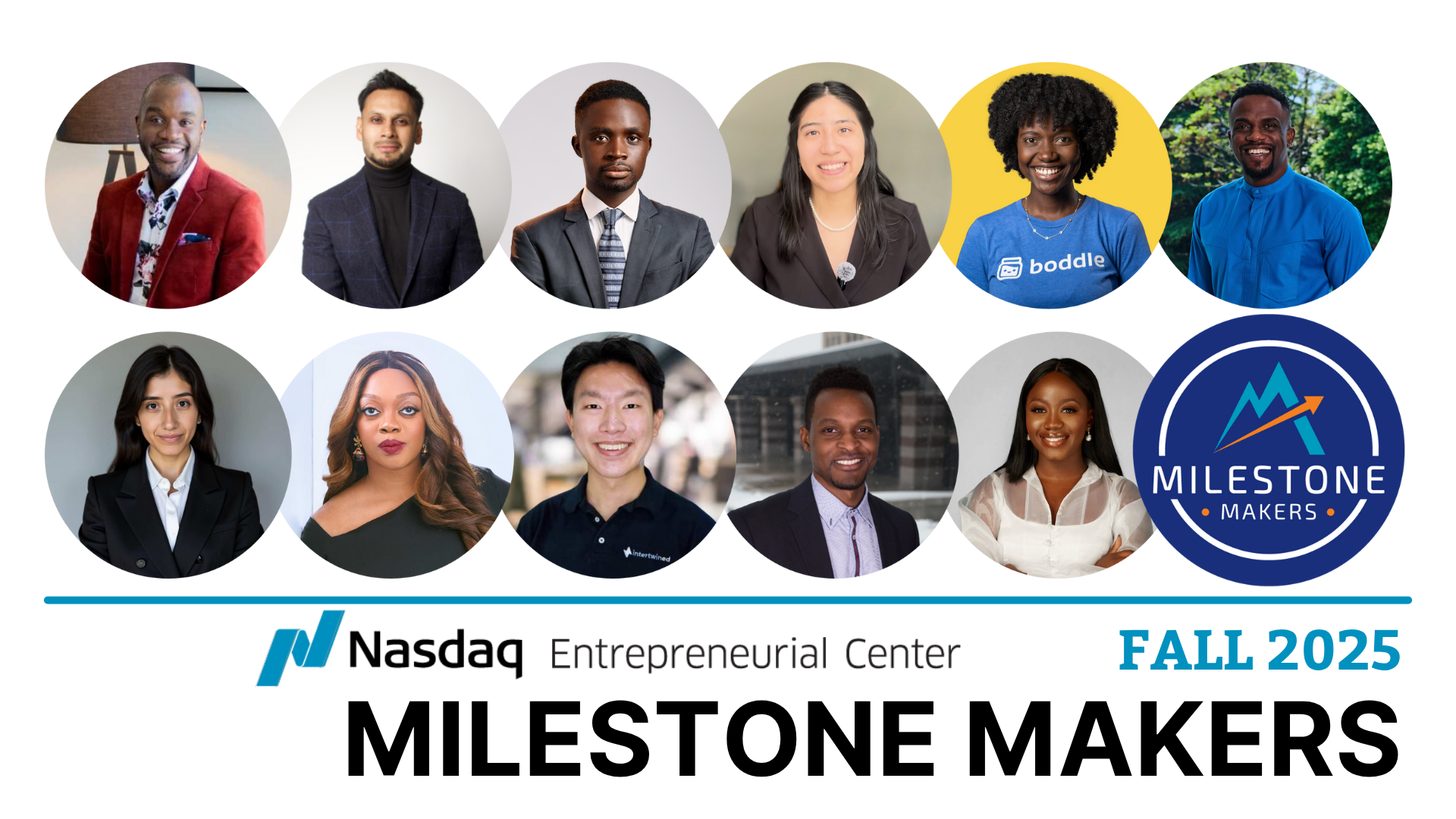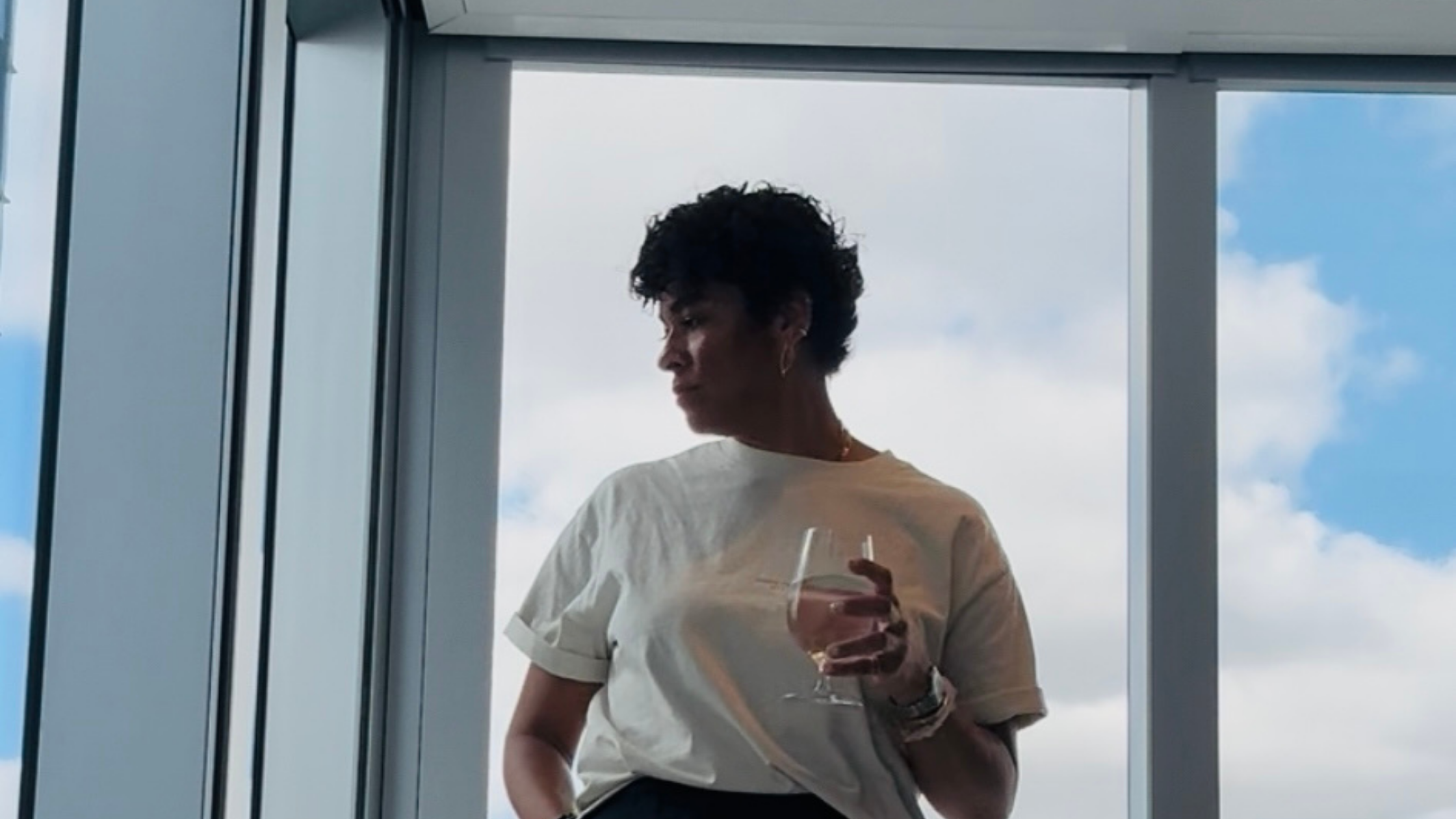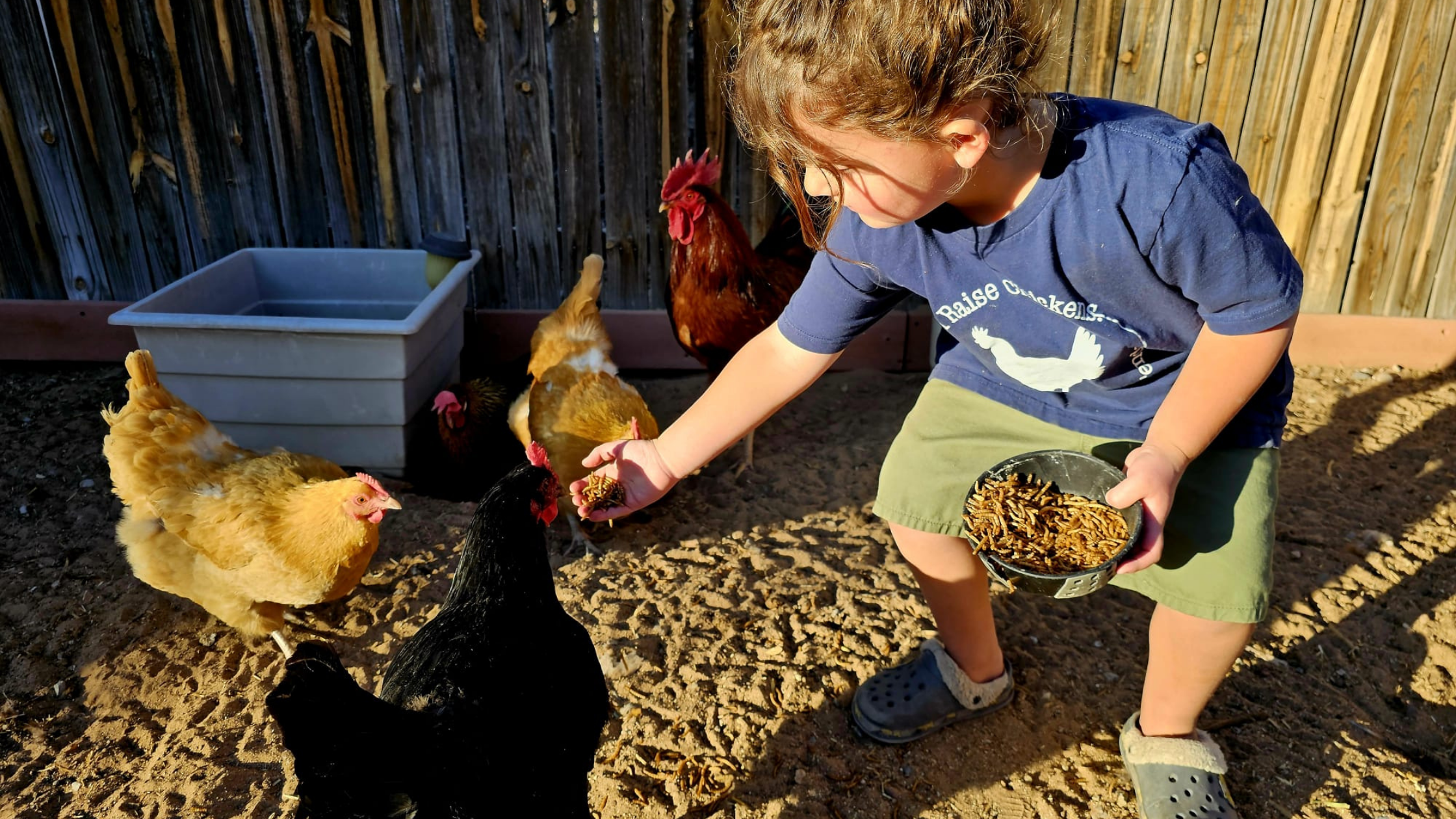Aly Orady is the CEO and Founder of Tonal, the first in-home smart gym and personalized approach to strength training. A 20-year silicon valley veteran, engineer and serial entrepreneur, Orady started his career at Hewlett-Packard’s Computer Systems Laboratory designing super-computers, followed by technical leadership roles at a series of startups, including Kealia, Inc. Armed with an M.S.E.E. from Stanford, and a B.Eng. from McMaster University, Orady founded Pano Logic, where he served as the company’s Chief Technology Officer and oversaw core technology development, architecture, and patents. Orady leveraged his extensive product and technology background with his own fitness journey and 70 lb weight loss to invent Tonal. His goal is to help enable people to lead healthier lives by providing them with the technology, guidance and support to effectively reach their fitness goal.
 What does “entrepreneurship” mean to you?
What does “entrepreneurship” mean to you?
Aly Orady: I define entrepreneurship as “being driven by passion and courage to build something de novo in the face of unknowns, risks, and skepticism.”
How did your company come to be?
AO: Fifteen years into my career designing supercomputers and carrier infrastructure, my health had become a complete disaster — I had developed Type 2 diabetes and sleep apnea. I decided to focus on my health full time, which led to me losing 70 lbs in 9 months and developing a passion for fitness and strength training. One early morning at the gym, I was sitting on a bench staring at this giant strength training machine wondering if I could somehow strength train in the convenience of my home instead of having to come to the gym each morning. The a-ha moment was when I realized that the reason strength equipment was so big and bulky is because it relied on big metal plates and gravity to function, and that if I could create a strength training system that ran on electricity instead, I could both shrink it down and make it intelligent at the same time. This led to creating Tonal – the first digital strength machine powered by electromagnetic digital weights with a personal trainer built in.
How has your business changed in response to the COVID-19 pandemic?
AO: We were already seeing strong momentum in the connected fitness space, and the pandemic has really accelerated that trend. We saw a sales increase of over 8x with no signs of that slowing down. Even when gyms eventually reopen, we think that the new habits people have formed will continue and that the life-changing results they are seeing from Tonal will continue to outweigh other options.
What is your proudest and darkest moment so far? Share a key high and a key low from your journey if you can.
AO: All of my proudest moments center around the team we have built at Tonal. It’s when I see them do amazing things with little to no involvement from me. Tonal is a highly mission driven business, and the Tonal team lives and breathes our mission to help everyone be their strongest. My lowest point at Tonal was about a year before launch when I went through our most difficult fundraising cycle. We were all so committed to the vision of the business, but I knew that if I couldn’t get the funding round closed, I’d be letting the team down and the world might have never gotten to see Tonal. Fortunately, it worked out well in the end.
How is your company changing the landscape?
AO: Tonal is delivering the world’s smartest home gym (Men’s Health’s words, not ours), with personal training built in. Before Tonal, the best alternative was to travel to a gym and meet with a personal trainer. That’s costly and inconvenient. With Tonal, our members are able to achieve their goals from the convenience of their homes. This expands access to personal training benefits to a market of 45M households rather than the niche market that currently uses personal trainers.
What do you wish you knew when you started? Is there anything you would do differently?
AO: With the benefit of hindsight, there are lots of things I would do differently! But if there was one thing, I would have surrounded myself with even more advisors in the areas my team and I had the least prior experience. In the early days of a business you’re largely hiring people that are entrepreneurial, which implies they know how to figure things out. But those people need people around them who have a lot of deep experience in the most important elements of what we’re trying to accomplish.
What advice/credo do you live by as you grow the business / what is your professional and personal mission statement?
AO: Humility is the key to doing great and sustainable things. Those are the types of things where you are doing things no one has done before, and you have to be willing to learn and question your own assumptions. My entire life and career, I’ve always been driven by two recurring things: Learning new things and building communities.
Where do you find inspiration when faced with challenges?
AO: At Tonal, I get inspiration from our amazing community and our incredible team. We may not always have the answers to every challenge, but at a minimum I can get the inspiration to do whatever it takes to overcome any challenge.
What does “success” look like for you? What do you think will help you achieve it?
AO: I believe that no company has ever had the opportunity to more greatly impact the trajectory of health in the United States and the rest of the world. When everyone can be their strongest using Tonal, we will see a decline in the incidence of obesity, diabetes, and injury.
Has personal or professional “success” changed for you since the COVID-19 pandemic?
AO: Leading a team remotely is much harder than doing it in person, especially if you care about culture, customer service, and quality. Doing so in the face of global supply chain and logistics challenges while demand is increasing rapidly is even harder. I’ve shifted so much more of my focus to building and leading the team, and shaping culture.
What’s it like to work alone or with your partners? What advice do you have for fellow entrepreneurs about building and leading teams?
AO: From the earliest days, be very intentional about defining your culture and building your team. Do these things before you think you need them, and hire your most important people before you think you need them. It’s so much harder to fix culture once it’s broken, or to hire a key leader on your team months after you desperately need them.
Many entrepreneurs continue to perfect their daily routines to support their work and greater vision; would you mind sharing your morning routine or a regular ritual that grounds your work each day? How has it changed in recent months?
AO: I start every workday with quiet time for me to center and orient myself. I spent most of my day communicating with my team, and it takes time each morning to consider my day ahead and the most important things I need people to know. I end each day with reading time, where I am often reading work materials in preparation for the next day (we’ve shifted many of our meetings to a pre-read ahead of the meeting, with us jumping straight into discussion in the meeting with no formal presentation).
What keeps you motivated during this time?
AO: Simply put, we are changing people’s lives for the better. We hear their stories every day! Sometimes it’s about someone that’s been able to transform their health or overcome years of back pain. Other times it’s about someone that’s surprised at how strong they had become.
What kind of an entrepreneur do you want to be known as, as in, what do you want your legacy to be?
AO: I view myself as an innovator and believe that we can change the world by rejecting any assumptions about the way things must be and being creative about how they can be.
What is a quote or some words of wisdom that help get you through the tough days?
AO: Not words of wisdom, but actions of wisdom: I often find that in tough situations, I ask myself what one of my role models would do in that situation, and then try to channel them. I’ve learned most from watching other people handle or think through difficult situations or decisions. Leveraging wisdom behind their actions has been powerful.
Have you experienced mentorship in your career? Do you feel it was easily available to you?
AO: I have an executive coach and am in a CEO coaching program, as well. I also have access to a lot of advisors and have an experienced board of directors including several independent directors. Mentorship and continuous development are absolutely essential to success.
Who are the people who have mentored or influenced you in your life or career? How has their influence changed the trajectory of your entrepreneurial journey?
AO: There are too many to name! Sometimes it’s someone who invested very little time with me but had a massive impact on the trajectory of the journey, and other times it’s someone that has spent countless hours on the journey with me. Overall, my pool of mentors fall into the category of founders & executives at other companies, board members, and professional coaches. I also can’t neglect to mention the impact that many of the books that I’ve read has had on my journey.
Do you have someone you’d like to nominate to be profiled in our Faces of Entrepreneurship series? Please let us know by emailing media@thecenter.nasdaq.org.




